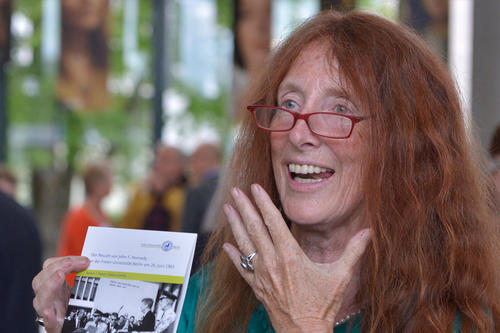Greatly Influenced by Kennedy's Speech
Eva Quistorp, born in 1945, was on a class trip to Berlin during President Kennedy's visit to the city.
Jul 08, 2013
Eva Quistorp, born in 1945, was on a class trip to Berlin during President Kennedy's visit to the city. The encounter in Dahlem made a lasting impression on her.
Image Credit: Bernd Wannenmacher
"Fortunately, in 1963 there were school trips to West Berlin, even from the small town of Kleve on the Lower Rhine. In our youth hostel we were listening to the radio and were all very excited, when we learned that the President of the United States was in the city. A girl from my class and I managed to reach the edge of the crowds at the Schöneberg City Hall, but at that time, I did not feel comfortable around such huge crowds of people. Another friend suggested going to the campus of Freie Universität, where President Kennedy was scheduled to give a second speech in the afternoon.
As chance would have it, President Kennedy's elegant limousine stopped in front of the entrance to the Henry Ford Building, where he was to give his speech, precisely at the moment when we were standing there. I was completely spellbound when I saw what a handsome, elegant young man got out of the car. We weren't used to that among German politicians. In my excitement, I held both of my hands over my mouth, as can be seen in a photograph of the encounter. Unimaginable nowadays, we didn't see any security guards, and there were no big television cameras obscuring our view.
Kennedy came right up close to us and smiled at me, but I didn't dare to stretch out my hand. As the daughter of a pastor whose family had resisted the Nazis, I had been taught not to admire stars or those in power. At that time I was also a little shy. Since I was so close to him, when he smiled at me, I followed President Kennedy's speech in somewhat of a trance. On that lovely summer day, everything seemed so light and cosmopolitan. It seemed to be the beginning of a new era, after the Holocaust and World War II, which had ended just 18 years previously.
My encounter with Kennedy had a long-lasting effect on me, as did the news of his assassination a few months later. The terrible news that I heard on my old Braun radio seemed to threaten our very existence. It seemed that dark forces were again at work in history, making it possible to murder a person on whom so many hopes had been pinned. It was a major loss that hit me just as hard as the assassinations of human rights activist Martin Luther King and Robert F. Kennedy, the murder of the innocent student Benno Ohnesorg, the near-assassination of student leader Rudi Dutschke, and the overthrow of Chilean President Salvador Allende. All of these events combined to motivate me to get involved in civil affairs and actively work toward a just and democratic society – in Europe and worldwide. In the spirit of Kennedy's speech I, like many others, put my efforts into serving society, democratization, and justice. Along the way I met Coretta Scott King, the American civil rights activist and wife of Martin Luther King; the former activist against apartheid and later President of South Africa, Nelson Mandela; and U.S. President Barack Obama."
About the Witness
Eva Quistorp, 67, studied Protestant theology, German language and literature, and political science from 1965 to 1972 at Freie Universität Berlin. In the years 1979/1980 she was, along with Petra Kelly and Joseph Beuys, one of the founders of the German Green Party. From 1986 to 1988 she was on the national executive committee of the German Green Party, and from 1989 to 1994, she was a member of the European Parliament, while still a member of the Green Party. Eva Quistorp was actively involved in bottom-up environmental initiatives and was one of the driving forces in the peace movement. She continues to campaign for the rights of women worldwide and is actively involved in the Society for Threatened Peoples. She was one of the founders of the Heinrich Böll Foundation, a non-profit organization striving to promote democracy, civil society, equality, and a healthy environment.

